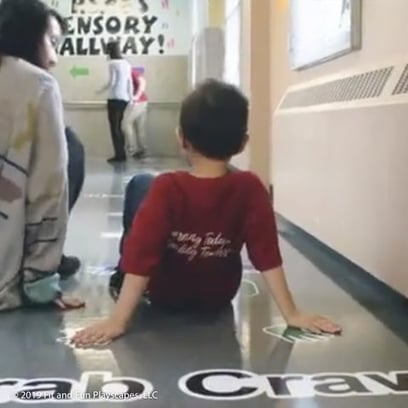Difficulty With Self-Regulation + The Importance Of Sensory Motor Skills
Self-Regulation and Sensory Motor Skills
Kids who have trouble with tactile, proprioception or the vestibular senses often struggle with motor skills that require midline crossing and motor planning. In addition, these same children may have difficulty managing impulsive behavior or responding appropriately to the stimuli in the environment.
When a teacher asks the children to line up for recess, you may see one or two of the children sprint to the door, shoving and pushing, while another may wait hesitantly and not want to leave the room. Both examples demonstrate the variety of responses children with sensory processing delays exhibit when presented with a basic task. To address these responses, it is important to recognize the sensory needs (learn more here) of the children you are teaching. Some children may move awkwardly or have a lot of extraneous movements and be clumsy.
Activities that require motor planning such as running through cones or across a field or even going up and down stairs may be difficult. Children who struggle with vestibular issues and motor planning may move very cautiously or avoid activities that they perceive are too challenging. Other children may do just the opposite and act impulsively, which often lessens the quality of the movement or performance. This often leads to frustration for not performing at the level they want (e.g. making a basket, or kicking a ball).
Sensory processing delays make it difficult to manage the intensity or force of movements required for some tasks.
For example, children with sensory processing issues may throw an object at full force even though the target is close. Others may not throw it hard enough. Many will struggle with gripping and pushing too hard with a pencil or crayon often ripping the page.
Children who have difficulty with regulation may squeeze too hard when shaking hands or giving a hug. Or when giving a “high five,” swing so hard they miss the target. Giving children opportunities to learn to regulate their bodies is critical for learning self-regulatory behaviors. Practicing how to slow down or manage their body while moving along a sensory pathway is a great way to promote self-regulation. 
It is important to recognize that every child is different. Some may be in constant motion seeking sensory input from their environment. This is often demonstrated by children who bump into things or seem out of control when moving quickly. When kids don’t get enough feedback from the sensory system, they may exaggerate their movements to get the information they need from the environment. Walking down the hallway, they may keep one hand in contact or even bump into the wall to feel more aware of their body. These same children will often squirm in their seats while at their desk or get up frequently to move about the room.
Giving children the opportunity to jump on a trampoline repeatedly, balance on a balance board (or Spooner Board) or carry something heavy helps their sensory system find the homeostasis, or “balance,” they need to control their bodies and self-regulate.
ABOUT THE AUTHOR

Timothy D. Davis, Ph.D. CAPE teaches undergraduate and graduate courses at the State University of New York (SUNY) Cortland. Some of his courses include Adapted Physical Activity and Sport, Motor Development, Instructional Strategies in APE, Inclusive Outdoor Education and Positive Behavior Management and Discipline. He has been teaching for over 20 years and holds bachelor's and master's degrees in Physical Education and Adapted Physical Education from California State University at Chico. He holds a Ph.D. in Adapted Physical Education from the University of Virginia.
At SUNY Cortland, Dr. Davis serves as director of the SUNY Cortland CHAMP/I Can Do It Afterschool Peer Mentorship Program and the Sensory Integration/Motor Integration (SIMS) program. He is the creator of Project DREAM, a learning program that helps kids and students with disabilities, and Project LEAPE, a leadership course dedicated to helping kids and adults with disabilities.
Have further questions? Dr. Tim can be reached by visiting this page.
Updated 3/24/2022




Leave a comment